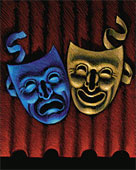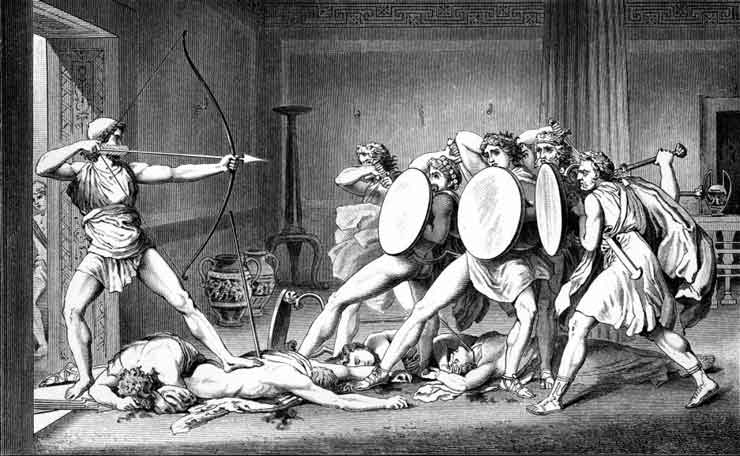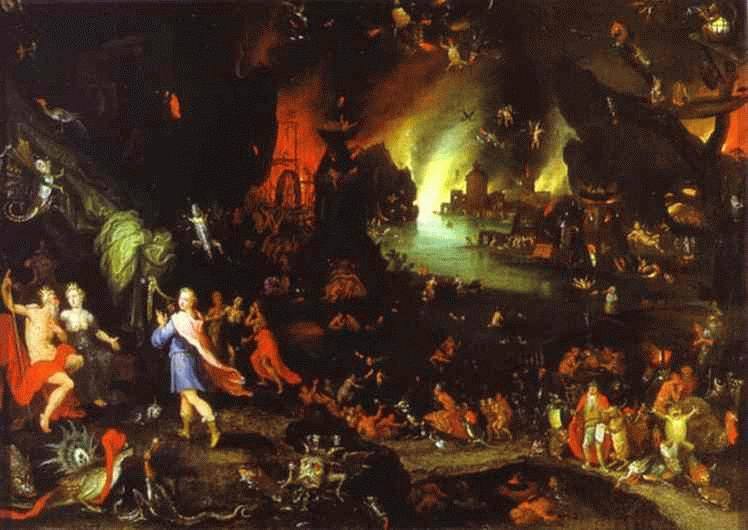|
 Show Biz Odyssey Show Biz Odyssey
A Guide to Understanding the World of Odysseus by Getting into Character!
A WebQuest
for 9th Grade World Literature Classes (Greek Mythology)
Designed
by
Kayla Burke
kaylaeliseb@gmail.com

Introduction
| Task
| Process
| Evaluation
| Conclusion
| Credits
| Teacher
Page
Introduction
You are part of a popular New York theatre group called The Classics.
Every year, you and your group do an educational project in which you
choose one classic work of literature and adapt it for the stage.
You give one free early performance to the schools in the area, and you
get heaps of money for the rest of your performances!
Well, you would get heaps of money had your little project not failed the past two years in a row...
According to the critics, your group's performance of Charlotte Bronte's Wuthering Heights
was "a snore-fest," the "dialogue was traditional...and boring," and
"the narrator was a useless waste of space." Naturally, your
group decided to pick a more adventurous work to do last summer, one
that was sure to keep audiences on their toes--Beowulf.
Sure, your audience stayed awake, but only because they were laughing
at Beowulf's ridiculous but era appropriate outfit.
Unfortunately, the critics didn't like it either. Your most
positive criticism noted, "It might have been a good play, had anybody
been able to understand the characters' thousand-year-old dialect. It
was like eighth-grade Shakespeare all over again; I couldn't understand
a thing!"
Needless to say, the producers are not pleased, and your little theatre
group is quickly running out of money. This year's production
will be your only chance to save your business! You must put on
the most epic play based off of a literary work that New York has ever
seen! Of course, you can only put on an epic play if you have an
epic story, and nothing fits that description better than Homer's The Odyssey.
But, if your audience laughed at Beowulf's costume, they will certainly
go into hysterics over Odysseus's lack of pants! And the language
in The Odyssey is just as
difficult as the language in Beowulf, no matter what translation you
use! What can you do to make this epic tale relatable and
interesting to your student audience and keep your critics at bay?
I've got one word for you: MODERNIZATION!!
I mean it worked for the Coen Brothers (Oh Brother Where Art Thou was a modernization of The Odyssey). And Romeo + Juliet was the movie that launched Leonardo diCaprio's career (sort of). Not to mention the huge success of The Lion King (based off Hamlet).
Modernizing is the answer! Just change the time period a bit
(heck, you could even make it a futuristic space odyssey). Your
audience should have no problem relating to it, and the critics would
love a fresh take on the ancient story. Of course, you will have
to change a lot of other things as well, such as language, costumes,
and maybe some characters, but I'm sure you'll work it out! I
just know that you and your team will have it all together in no
time--and by "no time" I mean your producers want a short preview of
this new play by the end of this week.
Good luck!
~Your Classy Classics Manager
P.S. While creating your theatre masterpiece, you might want to consider some of the following questions:
- How can I make my character(s) more relatable? Do I have anything in common with any of Homer's characters?
- What would Homer do? What would he think of me modernizing his characters and story?
- How would these characters behave in a modern world?
- What are the most important themes from Homer's story and how can I emphasize those themes to my audience?
|
Task
This WebQuest is designed to help you gain a deeper understanding of
Homer’s characters, tone, culture, and themes in The Odyssey while
practicing your writing skills and demonstrating your research
abilities. Acting as a struggling New York theatre group you will
research characters, analyze themes, research Greek culture, examine
critical reviews, and study previously adapted works in order to
modernize a scene from Homer’s epic and perform it in front of the
class. When you have completed this WebQuest you will have a
better understanding of Greek mythology and the essential qualities of
an epic.
After completing this WebQuest, the following Alabama State Standards will have been met:
1.) Identify genre, tone, and plot in short stories, drama,
and poetry and identify organizational structure in essays and other
nonfiction text to comprehend recreational reading materials.
• Reading predominantly world literature
2.) Compare the use of language and literary elements and devices,
including rhythm, rhyme scheme, tone, and plot, in various selections,
cultures, and genres.
Examples:
- language--Standard English usage versus dialect, length and complexity of sentences, diction
- literary elements and devices--flashback, personification
• Interpreting symbolism and other figurative language
• Recognizing foreshadowing to anticipate events
• Making inferences about characters and their motives
• Determining effectiveness of diction
7.) Write in narrative, expository, and persuasive modes using
figurative language and imagery, including simile and metaphor, when
effective and appropriate.
13.) Demonstrate paraphrasing, quoting, and summarizing of primary and secondary sources and various methods of note taking.
16.) Evaluate a speech for use of presentation skills, including use of visual aids.
17.) Use supporting details to present a position and to respond to an argument.
|
Group 1
|
|
Book I: The
Assembly of the Gods; Athene Talks to Telemachus; The Challenge from Telemachus
to the Suitors
You do not have to perform every scene from this book; you
just have to do enough to make your play interesting and ten to fifteen
minutes long. That is part of
the difficulty of the assignment.
|
|
| Group 2 |
|
Book IX:
Odysseus Declares Himself and Begins his Story

You do not have to perform every scene from this
book. In fact, you may just want
to do the scene with Polyphemus. Either way, you must do enough to
make your play interesting and ten to fifteen minutes long.
|
|
Group 3
|
|
Book XI:
Visit to the Dead
You do not have to perform every scene from this book; you
just have to do enough to make your play interesting and ten to fifteen
minutes long. That is part of
the difficulty of the assignment.
|
|
Group 4
|
|
Book XXI and/or Book XXII: Trial of the Axes; Odysseus Fights the Suitors 
You do not have to perform every scene from this book; you
just have to do enough to make your play interesting and ten to fifteen
minutes long. That is part of
the difficulty of the assignment.
|
|
The
Process
Phase 1: Brainstorming
1. First, you will
be assigned to one of the four groups listed above.
2. As soon as you
get into your group, everyone should choose a role:
the Director, the
Playwright, or an Actor. There can only be one director and only one
playwright. There should be as many actors as the scene calls
for. The director and playwright can have a small cameo role if
necessary (such as “giant rock”). This is to ensure that each
student has an equal workload.
3. Your group will then
read the scene they have been assigned. You may do
this aloud, or you may do so individually. Make sure to take
notes as you read. Note sentences that stick out, segments that
might represent a theme in Homer’s tale, etc. Ask yourself
questions like, “Why did that character say that?” “Why would Homer
mention that?” “How could I get that thought across on stage?” or “I
wonder how that makes the character feel?”
4. After the group has
finished reading, you and your fellow group members should share notes,
answer each other’s questions, and brainstorm how they will present
this scene as a play.
5. Choose a time period
for your play. It can be completely modern or futuristic but it
must be post-1920 (since the story is about a journey home from a war,
you have the option of making it a WWII play).
6. Choose a location for
your play. The story may occur in Ithaca, along the coast of
Normandy, in some backwoods trailer park, in the American ghetto, or
wherever your imaginations take it. Be creative! Just
remember that the location will affect the characters’ language,
attitudes, and culture.
7. Cast your play. Each of your actors must have a character to play.
Phase 2: Research and Script Development
1. After
everyone has his or her roles, you can begin your research. This might
be the most important phase of the process. I anyone in the group
slacks on research, the play will not be successful. You may want
to spend a full day researching. Take your time and make sure
that you don’t miss anything. You have to be well informed in
order to put on a good show. You may want to share your research
with other members of the group as you go along, especially if you have
any ideas for the script.
2. At the end of that
class period your group will meet for another brainstorming
session. You will take share your research, take notes from your
other group members, and come up with ideas on for your play.
Together, the group will make an outline of their script.
3. For homework, the
playwright will write the first draft of the script (it should be no
more than ten minutes long). The playwright will make sure to
have enough copies of the scrip for everyone to use the next day.
Phase 3: Read-aloud and Edit
1. Your
group will do a “dry reading” of your script. That is, each actor
will read aloud the role they are going to perform. As you read,
you will want to look for typos and grammatical errors in the
script. You will also be reading to check the fluency of the
dialogue.
2. After reading, the
actors and the director will point out any issues they had with the
script, such as dialogue not matching character or other things.
3. Changes will be made and the group will come to a consensus about the final script.
4. The group will read the newly edited script aloud once more to check the timing and the fluency.
5. The playwright will edit and finish the final draft of the script before the next class.
Phase 4: The Director Takes the Lead
1. This next day, you and your group will spend the class-time rehearsing.
2. The director will set and block the stage.
3. As the actors
run through the play, (with the playwright helping with props) they
will need to memorized their lines, cues, etc.
4. The director will take
notes and give constructive criticism to his or her actors, making sure
to be courteous and considerate of the actors’ feelings.
5. By the end of class,
you and your group should have gone through the play at least one full
time without interruption. If you are on schedule, your
performance will be the next time your class meets.
Phase 5: Performance
1. Finally,
the big day arrives! Your group will perform your play in front
of your producer (your teacher) and your critics (your other
classmates). You will make sure to have all of you written
documents (journals, notes, scripts, etc.) together and well organized
to give your “producer” at the end of your performance.
2. You will take
notes on the other groups’ performances and choose one performance to
use to write your critical review.
Final Phase: The Critics
1. For
homework, you will research and read the critical reviews on the New York Times Theatre Review page and/or MetaCritic. As you read, note the structure of these reviews, the
author’s reasoning for giving a high or low rating, and think of ways
you could use this technique to write your own review of one of the
plays (you may NOT choose to write a review on your own play).
2. You will now write a
one-page, 250-300 word review on one of the plays to give to your
teacher the next time the class meets. Your classmates will not
read your reviews, so you can be brutally honest. However,
whether you give a five star rating or a no star rating, you must
explain your reasoning in your critique.
3. For example: you
cannot simply write, “This portrayal of Odysseus was awful,” or, “I
really hated the way she played Penelope.” You must explain why
your stance and back it up with information from your research.
4. You will turn this assignment in to your teacher at the beginning of your next class meeting.
5. After watching the plays, evaluating
the research, and reading the critiques your
producer will announce the best play.
Roles:
Roles
|
|
Director
|
As the director your job is to research and study the
themes of The Odyssey that are represented in your group’s passage to see how
those themes can be represented through your play. You will need to decide how you can make those themes applicable
to your modern audience. You
will also need to research Literary Adaptation and some of the examples of
“modernizing” literature provided.
As the director you should give constructive criticism during
rehearsals. Work closely with
the group members to make sure that everyone is on the same page.
You will keep a director’s journal that will be organized
into three sections: section one is for your notes on the themes you’ve
researched, section two holds your explanation of how you will use those
themes in your play, and the third section is for rehearsal notes.
|
|
Resources:
Themes
Literary Adaptation
Modernizing Shakespeare
|
Examples of Modern Adaptations:
O Brother, Where Art Thou (The Odyssey)
Romeo + Juliet (Romeo and Juliet)
Hamlet 2000 (Hamlet)
The Odyssey Student Project
|
|
Playwright
|
As the playwright your job will be to research script
formats and other modern adaptations of literary works such as those
indicated. You will work closely
with the other group members as they research, and you must be open to their
recommendations. You will then write
the first and final draft of the script. You must turn BOTH drafts in when you are finished with
the.
You will also keep a Journal for this assignment. However, because you will
already be writing the script, your journal will only need to include your
notes from your research.
|
|
Resources:
Playwriting Format
Playwriting 101
Modernizing Shakespeare
|
Examples of Modern Adaptations:
O Brother, Where Art Thou (The Odyssey)
Romeo + Juliet (Romeo and Juliet)
Hamlet 2000 (Hamlet)
The Odyssey Student Project
|
|
Actor
|
As one of the actors, you will first have to choose a
character. Then, it is time to
“become” that character. To do
this you will need to use the links provided to research your character. You will have to infer your
character’s tone, actions, and reactions from our research and from the
text. You will also have to decipher
how your character might act in a modern society in the location your play
will be set. As you outline your
character, you should ask questions such as, “How might this change in
society change my character?”
In order to track your thinking, you will need to keep a
character journal. This
character journal will be divided into three sections: section one is for the
notes and source list you will make during reading/researching your character
(these should include ideas for your character), section two is for your
character outline where you will define your character, and section three is
for the notes the director gives you during rehearsal.
Note: If you
have a character who is nameless—such as a soldier—your resources
will have you looking up the roles of soldiers in Greek society or modern
military programs. Also, when
you define your character in section two, you should name him/her and be
creative.
|
|
Resources:
If your specific character is not listed in the chart below, please
check out the following links for research:
Myth Web
The Glory
That Was Greece
Encyclopedia
Mythica
THEOI Greek Mythology
Greek
Mythology
The
Pantheon (gods and goddesses only)
ThinkQuest.org
|
Evaluation
|
Beginning
1
|
Developing
2
|
Accomplished
3
|
Exemplary
4
|
Score
|
|
Participation
|
Made little effort to participate in group activities. Gave little input in discussions.
|
Did some personal research and took group notes, but did not provide input or feedback.
|
Participated well with group members. Gave good input during discussions; willing to do tasks assigned.
|
Made sure all voices were heard during group discussions. Willing to volunteer for less popular roles.
|
|
|
Research Journals
|
Wrote a few sentences for personal ideas, but did not take research notes. Did not divide the journal into categories.
|
Has
notes from one of the resources provided along with ideas and other
required information, but journal is not divided into categories.
|
Has
notes pertaining to two or three of the resources provided, including
notes from the books. Has all required information, and the journal is divided
into categories.
|
Has
notes pertaining to two or three of the resources provided including
notes from the book and some notes from outside resources. Well
organized.
|
|
|
Script
(Playwright only)
|
Has only one draft, and the draft is too short. Actors had to improvise. Format is incorrect.
|
Has only one draft, which has no grammatical errors and is the draft used for the performance. Format has no errors.
|
Turned
in both final and original drafts for the script. Both were well
formatted and easy to read, but there was little evidence of changes
made by group members.
|
Turned
in both final and original drafts for the script. Both were well
formatted and easy to read. Changes were made.
|
|
|
Rehearsal
(Director only)
|
Did not run a rehearsal. Would not take charge.
|
Was badly prepared for rehearsal. Did not complete one full run-through of play.
|
Ran well-organized rehearsal. Had scene blocking planned out. Helped actors to be well prepared for performance.
|
Rehearsal
ran smoothly and was well thought out. The actors were given good
feedback and were able to complete two full run-through.
|
|
|
Performance
(Actors only)
|
Unwilling
to participate in performance. Constantly dropped lines.
Had obviously not practiced. Did not take role seriously.
|
Participated, but did not have lines memorized. Distracted audience.
|
Participated and had obviously worked hard on learning lines and getting into character.
|
Participated
and worked hard to memorize lines. Got into character very well,
using props and costumes to emphasize character personality.
|
|
Critical Reviews
|
Wrote only a few lines. Did not take a clear stance or give a clear rating for the play critiqued
|
Wrote adequate amount, but points were still unclear.
|
Gave a clear rating; reasons for the rating were clear. Followed all directions well.
|
Gave a clear
rating; reasons for the rating were clear and well warranted. Made
several good points, and followed all directions.
|
|
Total:
|
|
|
|
|
/16
|
Conclusion
When
you have completed this WebQuest, I hope that you will have not only
learned more about Greek mythology and gained a better understanding of
the text, but that you will have learned how to find and evaluate
themes, learned how to apply those themes to your modern life,
developed better researching skills, and formed a relationship with
these classic Greek characters. Also, you will have learned how
to work cooperatively in groups, learned how to "plan" group meetings
and rehearsals, and developed team skills that you will use in the real
world.
Also, I hope that you will have enjoyed this WebQuest, and that this
experience will have given you something to tell your friends about.
Credits
& References
Images:
http://www.zunal.com/myaccount/uploads/olympian%5B1%5D.jpg
http://www.wayland.k12.ma.us/high_school/english/webenglishdj/images/Odysseus_Blinding_Polyphemu.jpg
http://semodyssey3.wikispaces.com/file/view/hades2.jpg/58519798/hades2.jpg
http://www.mlahanas.de/Greeks/Mythology/Images/OdysseusSuitorsSchwab.jpg
State Standards found at:
http://alex.state.al.us/index.php
Last
updated on August 1, 2010.
Based
on a template from The
WebQuest Page
|
 Show Biz Odyssey
Show Biz Odyssey



